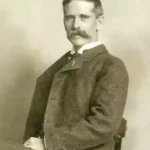 | |
A Year of Nobility | |
| Author | Henry van Dyke |
|---|---|
| Published |
1888
|
| Language | English |
| Nationality | American |
| Genre | Essays, Poetry |
1888 Short Story
A Year of Nobility
A Year of Nobility is an English Essays, Poetry short story by American writer Henry van Dyke. It was first published in 1888.
A Year of Nobility
by Henry van Dyke
I
ENTER THE MARQUIS
The Marquis sat by the camp-fire peeling potatoes.
To look at him, you never would have taken him for a marquis. His costume was a pair of corduroy trousers; a blue flannel shirt, patched at elbows with gray; lumberman’s boots, flat-footed, shapeless, with loose leather legs strapped just below the knee, and wrinkled like the hide of an ancient rhinoceros; and a soft brown hat with several holes in the crown, as if it had done duty, at some time in its history, as an impromptu target in a shooting-match. A red woollen scarf twisted about his loins gave a touch of colour and picturesqueness.
It was not exactly a court dress, but it sat well on the powerful sinewy figure of the man. He never gave a thought to his looks, but peeled his potatoes with a dexterity which betrayed a past-master of the humble art, and threw the skins into the fire.
“Look you, m’sieu’,” he said to young Winthrop Alden, who sat on a fallen tree near him, mending the fly-rod which he had broken in the morning’s fishing, “look you, it is an affair of the most strange, yet of the most certain. We have known always that ours was a good family. The name tells it. The Lamottes are of la haute classe in France. But here, in Canada, we are poor. Yet the good blood dies not with the poverty. It is buried, hidden, but it remains the same. It is like these pataques. You plant good ones for seed: you get a good crop. You plant bad ones: you get a bad crop. But we did not know about the title in our family. No. We thought ours was a side-branch, an off-shoot. It was a great surprise to us. But it is certain,–beyond a doubt.”
Jean Lamotte’s deep voice was quiet and steady. It had the tone of assured conviction. His bright blue eyes above his ruddy mustache and bronzed cheeks, were clear and tranquil as those of a child.
Alden was immensely interested and amused. He was a member of the Boston branch of the Society for Ancestral Culture, and he recognized the favourite tenet of his sect,–the doctrine that “blood will tell.” He was also a Harvard man, knowing almost everything and believing hardly anything. Heredity was one of the few unquestioned articles of his creed. But the form in which this familiar confession of faith came to him, on the banks of the Grande Decharge, from the lips of a somewhat ragged and distinctly illiterate Canadian guide, was grotesque enough to satisfy the most modern taste for new sensations. He listened with an air of gravity, and a delighted sense of the humour of the situation.
“How did you find it out?” he asked.
“Well, then,” continued Jean, “I will tell you how the news came to me. It was at St. Gedeon, one Sunday last March. The snow was good and hard, and I drove in, ten miles on the lake, from our house opposite Grosse Ile. After mass, a man, evidently of the city, comes to me in the stable while I feed the horse, and salutes me.
“‘Is this Jean Lamotte?’
“‘At your service, m’sieu’.’
“‘Son of Francois Louis Lamotte?’
“‘Of no other. But he is dead, God give him repose.’
“‘I been looking for you all through Charlevoix and Chicoutimi.’
“‘Here you find me then, and good-day to you,’ says I, a little short, for I was beginning to be shy of him.
“‘Chut, chut,’ says he, very friendly. ‘I suppose you have time to talk a bit. How would you like to be a marquis and have a castle in France with a hundred thousand dollars?’
“For a moment I think I will lick him; then I laugh. ‘Very well indeed,’ says I, ‘and also a handful of stars for buckshot, and the new moon for a canoe.’
“‘But no,’ answers the man. ‘I am earnest, Monsieur Lamotte. I want to talk a long talk with you. Do you permit that I accompany you to your residence?’
“Residence! You know that little farm-house of logs where my mother lives,–you saw it last summer. But of course it is a pretty good house. It is clean. It is warm. So I bring the man home in the sleigh. All that evening he tells the story. How our name Lamotte is really De la Motte de la Luciere. How there belongs to that name an estate and a title in France, now thirty years with no one to claim it. How he, being an AVOCAT, has remarked the likeness of the names. How he has tracked the family through Montmorency and Quebec, in all the parish books. How he finds my great- grandfather’s great-grandfather, Etienne de La Motte who came to Canada two hundred years ago, a younger son of the Marquis de la Luciere. How he has the papers, many of them, with red seals on them. I saw them. ‘Of course,’ says he, ‘there are others of the family here to share the property. It must be divided. But it is large–enormous–millions of francs. And the largest share is yours, and the title, and a castle–a castle larger than Price’s saw-mill at Chicoutimi; with carpets, and electric lights, and coloured pictures on the wall, like the hotel at Roberval.’
“When my mother heard about that she was pleased. But me–when I heard that I was a marquis, I knew it was true.”
Jean’s blue eyes were wide open now, and sparkling brightly. He had put down the pan of potatoes. He was holding his head up and talking eagerly.
Alden turned away his face to light his pipe, and hide a smile. “Did he get–any money–out of you?”–came slowly between the puffs of smoke.
“Money!” answered Jean, “of course there must be money to carry on an affair of this kind. There was seventy dollars that I had cleaned up on the lumber-job last winter, and the mother had forty dollars from the cow she sold in the fall. A hundred and ten dollars,–we gave him that. He has gone to France to make the claim for us. Next spring he comes back, and I give him a hundred dollars more; when I get my property five thousand dollars more. It is little enough. A marquis must not be mean.”
Alden swore softly in English, under his breath. A rustic comedy, a joke on human nature, always pleased him; but beneath his cynical varnish he had a very honest heart, and he hated cruelty and injustice. He knew what a little money meant in the backwoods; what hard and bitter toil it cost to rake it together; what sacrifices and privations must follow its loss. If the smooth prospector of unclaimed estates in France had arrived at the camp on the Grande Decharge at that moment, Alden would have introduced him to the most unhappy hour of his life.
But with Jean Lamotte it was by no means so easy to deal. Alden perceived at once that ridicule would be worse than useless. The man was far too much in earnest. A jest about a marquis with holes in his hat! Yes, Jean would laugh at that very merrily; for he was a true VOYAGEUR. But a jest about the reality of the marquis! That struck him as almost profane. It was a fixed idea with him. Argument could not shake it. He had seen the papers. He knew it was true. All the strength of his vigorous and healthy manhood seemed to have gone into it suddenly, as if this was the news for which he had been waiting, unconsciously, since he was born.
It was not in the least morbid, visionary, abstract. It was concrete, actual, and so far as Alden could see, wholesome. It did not make Jean despise his present life. On the contrary, it appeared to lend a zest to it, as an interesting episode in the career of a nobleman. He was not restless; he was not discontented. His whole nature was at once elated and calmed. He was not at all feverish to get away from his familiar existence, from the woods and the waters he knew so well, from the large liberty of the unpeopled forest, the joyous rush of the great river, the splendid breadth of the open sky. Unconsciously these things had gone into his blood. Dimly he felt the premonitions of homesickness for them all. But he was lifted up to remember that the blood into which these things had entered was blue blood, and that though he lived in the wilderness he really belonged to la haute classe. A breath of romance, a spirit of chivalry from the days when the high-spirited courtiers of Louis XIV sought their fortune in the New World, seemed to pass into him. He spoke of it all with a kind of proud simplicity.
“It appears curious to m’sieu’, no doubt, but it has been so in Canada from the beginning. There were many nobles here in the old time. Frontenac,–he was a duke or a prince. Denonville,–he was a grand seigneur. La Salle, Vaudreuil,–these are all noble, counts or barons. I know not the difference, but the cure has told me the names. And the old Jacques Cartier, the father of all, when he went home to France, I have heard that the King made him a lord and gave him a castle. Why not? He was a capable man, a brave man; he could sail a big ship, he could run the rapids of the great river in his canoe. He could hunt the bear, the lynx, the carcajou. I suppose all these men,–marquises and counts and barons,–I suppose they all lived hard, and slept on the ground, and used the axe and the paddle when they came to the woods. It is not the fine coat that makes the noble. It is the good blood, the adventure, the brave heart.”
“Magnificent!” thought Alden. “It is the real thing, a bit of the seventeenth century lost in the forest for two hundred years. It is like finding an old rapier beside an Indian trail. I suppose the fellow may be the descendant of some gay young lieutenant of the regiment Carignan-Salieres, who came out with De Tracy, or Courcelles. An amour with the daughter of a habitant,–a name taken at random,–who can unravel the skein? But here’s the old thread of chivalry running through all the tangles, tarnished but unbroken.”
This was what he said to himself. What he said to Jean was, “Well, Jean, you and I have been together in the woods for two summers now, and marquis or no marquis, I hope this is not going to make any difference between us.”
“But certainly NOT!” answered Jean. “I am well content with m’sieu’, as I hope m’sieu’ is content with me. While I am AU BOIS, I ask no better than to be your guide. Besides, I must earn those other hundred dollars, for the payment in the spring.”
Alden tried to make him promise to give nothing more to the lawyer until he had something sure to show for his money. But Jean was politely non-committal on that point. It was evident that he felt the impossibility of meanness in a marquis. Why should he be sparing or cautious? That was for the merchant, not for the noble. A hundred, two hundred, three hundred dollars: What was that to an estate and a title? Nothing risk, nothing gain! He must live up to his role. Meantime he was ready to prove that he was the best guide on the Grande Decharge.
And so he was. There was not a man in all the Lake St. John country who knew the woods and waters as well as he did. Far up the great rivers Peribonca and Misstassini he had pushed his birch canoe, exploring the network of lakes and streams along the desolate Height of Land. He knew the Grand Brule, where the bears roam in September on the fire-scarred hills among the wide, unharvested fields of blueberries. He knew the hidden ponds and slow-creeping little rivers where the beavers build their dams, and raise their silent water-cities, like Venice lost in the woods. He knew the vast barrens, covered with stiff silvery moss, where the caribou fed in the winter. On the Decharge itself,–that tumultuous flood, never failing, never freezing, by which the great lake pours all its gathered waters in foam and fury down to the deep, still gorge of the Saguenay,–there Jean was at home. There was not a curl or eddy in the wild course of the river that he did not understand. The quiet little channels by which one could drop down behind the islands while the main stream made an impassable fall; the precise height of the water at which it was safe to run the Rapide Gervais; the point of rock on the brink of the Grande Chute where the canoe must whirl swiftly in to the shore if you did not wish to go over the cataract; the exact force of the tourniquet that sucked downward at one edge of the rapid, and of the bouillon that boiled upward at the other edge, as if the bottom of the river were heaving, and the narrow line of the FILET D’EAU along which the birch-bark might shoot in safety; the treachery of the smooth, oily curves where the brown water swept past the edge of the cliff, silent, gloomy, menacing; the hidden pathway through the foam where the canoe could run out securely and reach a favourite haunt of the ouananiche, the fish that loves the wildest water,–all these secrets were known to Jean. He read the river like a book. He loved it. He also respected it. He knew it too well to take liberties with it.
The camp, that June, was beside the Rapide des Cedres. A great ledge stretched across the river; the water came down in three leaps, brown above, golden at the edge, white where it fell. Below, on the left bank, there was a little cove behind a high point of rocks, a curving beach of white sand, a gentle slope of ground, a tent half hidden among the birches and balsams. Down the river, the main channel narrowed and deepened. High banks hemmed it in on the left, iron-coasted islands on the right. It was a sullen, powerful, dangerous stream. Beyond that, in mid-river, the Ile Maligne reared its wicked head, scarred, bristling with skeletons of dead trees. On either side of it, the river broke away into a long fury of rapids and falls in which no boat could live.
It was there, on the point of the island, that the most famous fishing in the river was found; and there Alden was determined to cast his fly before he went home. Ten days they had waited at the Cedars for the water to fall enough to make the passage to the island safe. At last Alden grew impatient. It was a superb morning,–sky like an immense blue gentian, air full of fragrance from a million bells of pink Linnaea, sunshine flattering the great river,–a morning when danger and death seemed incredible.
“To-day we are going to the island, Jean; the water must be low enough now.”
“Not yet, m’sieu’, I am sorry, but it is not yet.”
Alden laughed rather unpleasantly. “I believe you are afraid. I thought you were a good canoeman–”
“I am that,” said Jean, quietly, “and therefore,–well, it is the bad canoeman who is never afraid.”
“But last September you took your monsieur to the island and gave him fine fishing. Why won’t you do it for me? I believe you want to keep me away from this place and save it for him.”
Jean’s face flushed. “M’sieu’ has no reason to say that of me. I beg that he will not repeat it.”
Alden laughed again. He was somewhat irritated at Jean for taking the thing so seriously, for being so obstinate. On such a morning it was absurd. At least it would do no harm to make an effort to reach the island. If it proved impossible they could give it up. “All right, Jean,” he said, “I’ll take it back. You are only timid, that’s all. Francois here will go down with me. We can manage the canoe together. Jean can stay at home and keep the camp. Eh, Francois?”
Francois, the second guide, was a mush of vanity and good nature, with just sense enough to obey Jean’s orders, and just jealousy enough to make him jump at a chance to show his independence. He would like very well to be first man for a day,–perhaps for the next trip, if he had good luck. He grinned and nodded his head– “All ready, m’sieu’; I guess we can do it.”
But while he was holding the canoe steady for Alden to step out to his place in the bow, Jean came down and pushed him aside. “Go to bed, dam’ fool,” he muttered, shoved the canoe out into the river, and jumped lightly to his own place in the stern.
Alden smiled to himself and said nothing for a while. When they were a mile or two down the river he remarked, “So I see you changed your mind, Jean. Do you think better of the river now?”
“No, m’sieu’, I think the same.”
“Well then?”
“Because I must share the luck with you whether it is good or bad. It is no shame to have fear. The shame is not to face it. But one thing I ask of you–”
“And that is?”
“Kneel as low in the canoe as you can, paddle steady, and do not dodge when a wave comes.”
Alden was half inclined to turn back, and give it up. But pride made it difficult to say the word. Besides the fishing was sure to be superb; not a line had been wet there since last year. It was worth a little risk. The danger could not be so very great after all. How fair the river ran,–a current of living topaz between banks of emerald! What but good luck could come on such a day?
The canoe was gliding down the last smooth stretch. Alden lifted his head, as they turned the corner, and for the first time saw the passage close before him. His face went white, and he set his teeth.
The left-hand branch of the river, cleft by the rocky point of the island, dropped at once into a tumult of yellow foam and raved downward along the northern shore. The right-hand branch swerved away to the east, running with swift, silent fury. On the lower edge of this desperate race of brown billows, a huge whirlpool formed and dissolved every two or three minutes, now eddying round in a wide backwater into a rocky bay on the end of the island, now swept away by the rush of waves into the white rage of the rapids below.
There was the secret pathway. The trick was, to dart across the right-hand current at the proper moment, catch the rim of the whirlpool as it swung backward, and let it sweep you around to the end of the island. It was easy enough at low water. But now?
The smooth waves went crowding and shouldering down the slope as if they were running to a fight. The river rose and swelled with quick, uneven passion. The whirlpool was in its place one minute; the next, it was blotted out; everything rushed madly downward–and below was hell.
Jean checked the boat for a moment, quivering in the strong current, waiting for the TOURNIQUET to form again. Five seconds–ten seconds–“Now!” he cried.
The canoe shot obliquely into the stream, driven by strong, quick strokes of the paddles. It seemed almost to leap from wave to wave. All was going well. The edge of the whirlpool was near. Then came the crest of a larger wave,–slap–into the boat. Alden shrank involuntarily from the cold water, and missed his stroke. An eddy caught the bow and shoved it out. The whirlpool receded, dissolved. The whole river rushed down upon the canoe and carried it away like a leaf.
Who says that thought is swift and clear in a moment like that? Who talks about the whole of a man’s life passing before him in a flash of light? A flash of darkness! Thought is paralyzed, dumb. “What a fool!” “Good-bye!” “If–” That is about all it can say. And if the moment is prolonged, it says the same thing over again, stunned, bewildered, impotent. Then?–The rocking waves; the sinking boat; the roar of the fall; the swift overturn; the icy, blinding, strangling water–God!
Jean was flung shoreward. Instinctively he struck out, with the current and half across it, toward a point of rock. His foot touched bottom. He drew himself up and looked back. The canoe was sweeping past, bottom upward, Alden underneath it.
Jean thrust himself out into the stream again, still going with the current, but now away from shore. He gripped the canoe, flinging his arm over the stern. Then he got hold of the thwart and tried to turn it over. Too heavy! Groping underneath he caught Alden by the shoulder and pulled him out. They would have gone down together but for the boat.
“Hold on tight,” gasped Jean, “put your arm over the canoe–the other side!”
Alden, half dazed, obeyed him. The torrent carried the dancing, slippery bark past another point. Just below it, there was a little eddy.
“Now,” cried Jean; “the back-water–strike for the land!”
They touched the black, gliddery rocks. They staggered out of the water; waist-deep, knee-deep, ankle-deep; falling and rising again. They crawled up on the warm moss. . . .
The first thing that Alden noticed was the line of bright red spots on the wing of a cedar-bird fluttering silently through the branches of the tree above him. He lay still and watched it, wondering that he had never before observed those brilliant sparks of colour on the little brown bird. Then he wondered what made his legs ache so. Then he saw Jean, dripping wet, sitting on a stone and looking down the river.
He got up painfully and went over to him. He put his hand on the man’s shoulder.
“Jean, you saved my life–I thank you, Marquis!”
“M’sieu’,” said Jean, springing up, “I beg you not to mention it. It was nothing. A narrow shave,–but LA BONNE CHANCE! And after all, you were right,–we got to the island! But now how to get off?”
II
AN ALLIANCE OF RIVALS
Yes, of course they got off–the next day. At the foot of the island, two miles below, there is a place where the water runs quieter, and a BATEAU can cross from the main shore. Francois was frightened when the others did not come back in the evening. He made his way around to St. Joseph d’Alma, and got a boat to come up and look for their bodies. He found them on the shore, alive and very hungry. But all that has nothing to do with the story.
Nor does it make any difference how Alden spent the rest of his summer in the woods, what kind of fishing he had, or what moved him to leave five hundred dollars with Jean when he went away. That is all padding: leave it out. The first point of interest is what Jean did with the money. A suit of clothes, a new stove, and a set of kitchen utensils for the log house opposite Grosse Ile, a trip to Quebec, a little game of “Blof Americain” in the back room of the Hotel du Nord,–that was the end of the money.
This is not a Sunday-school story. Jean was no saint. Even as a hero he had his weak points. But after his own fashion he was a pretty good kind of a marquis. He took his headache the next morning as a matter of course, and his empty pocket as a trick of fortune. With the nobility, he knew very well, such things often happen; but the nobility do not complain about it. They go ahead, as if it was a bagatelle.
Before the week was out Jean was on his way to a lumber-shanty on the St. Maurice River, to cook for a crew of thirty men all winter.
The cook’s position in camp is curious,–half menial, half superior. It is no place for a feeble man. But a cook who is strong in the back and quick with his fists can make his office much respected. Wages, forty dollars a month; duties, to keep the pea-soup kettle always hot and the bread-pan always full, to stand the jokes of the camp up to a certain point, and after that to whip two or three of the most active humourists.
Jean performed all his duties to perfect satisfaction. Naturally most of the jokes turned upon his great expectations. With two of the principal jokers he had exchanged the usual and conclusive form of repartee,–flattened them out literally. The ordinary BADINAGE he did not mind in the least; it rather pleased him.
But about the first of January a new hand came into the camp,–a big, black-haired fellow from Three Rivers, Pierre Lamotte DIT Theophile. With him it was different. There seemed to be something serious in his jests about “the marquis.” It was not fun; it was mockery; always on the edge of anger. He acted as if he would be glad to make Jean ridiculous in any way.
Finally the matter came to a head. Something happened to the soup one Sunday morning–tobacco probably. Certainly it was very bad, only fit to throw away; and the whole camp was mad. It was not really Pierre who played the trick; but it was he who sneered that the camp would be better off if the cook knew less about castles and more about cooking. Jean answered that what the camp needed was to get rid of a badreux who thought it was a joke to poison the soup. Pierre took this as a personal allusion and requested him to discuss the question outside. But before the discussion began he made some general remarks about the character and pretensions of Jean.
“A marquis!” said he. “This bagoulard gives himself out for a marquis! He is nothing of the kind,–a rank humbug. There is a title in the family, an estate in France, it is true. But it is mine. I have seen the papers. I have paid money to the lawyer. I am waiting now for him to arrange the matter. This man knows nothing about it. He is a fraud. I will fight him now and settle the matter.”
If a bucket of ice-water had been thrown over Jean he could not have cooled off more suddenly. He was dazed. Another marquis? This was a complication he had never dreamed of. It overwhelmed him like an avalanche. He must have time to dig himself out of this difficulty.
“But stop,” he cried; “you go too fast. This is more serious than a pot of soup. I must hear about this. Let us talk first, Pierre, and afterwards–”
The camp was delighted. It was a fine comedy,–two fools instead of one. The men pricked up their ears and clamoured for a full explanation, a debate in open court.
But that was not Jean’s way. He had made no secret of his expectations, but he did not care to confide all the details of his family history to a crowd of fellows who would probably not understand and would certainly laugh. Pierre was wrong of course, but at least he was in earnest. That was something.
“This affair is between Pierre and me,” said Jean. “We shall speak of it by ourselves.”
In the snow-muffled forest, that afternoon, where the great tree- trunks rose like pillars of black granite from a marble floor, and the branches of spruce and fir wove a dark green roof above their heads, these two stray shoots of a noble stock tried to untangle their family history. It was little that they knew about it. They could get back to their grandfathers, but beyond that the trail was rather blind. Where they crossed neither Jean nor Pierre could tell. In fact, both of their minds had been empty vessels for the plausible lawyer to fill, and he had filled them with various and windy stuff. There were discrepancies and contradictions, denials and disputes, flashes of anger and clouds of suspicion.
But through all the voluble talk, somehow or other, the two men were drawing closer together. Pierre felt Jean’s force of character, his air of natural leadership, his bonhommie. He thought, “It was a shame for that lawyer to trick such a fine fellow with the story that he was the heir of the family.” Jean, for his part, was impressed by Pierre’s simplicity and firmness of conviction. He thought, “What a mean thing for that lawyer to fool such an innocent as this into supposing himself the inheritor of the title.” What never occurred to either of them was the idea that the lawyer had deceived them both. That was not to be dreamed of. To admit such a thought would have seemed to them like throwing away something of great value which they had just found. The family name, the papers, the links of the genealogy which had been so convincingly set forth,–all this had made an impression on their imagination, stronger than any logical argument. But which was the marquis? That was the question.
“Look here,” said Jean at last, “of what value is it that we fight? We are cousins. You think I am wrong. I think you are wrong. But one of us must be right. Who can tell? There will certainly be something for both of us. Blood is stronger than currant juice. Let us work together and help each other. You come home with me when this job is done. The lawyer returns to St. Gedeon in the spring. He will know. We can see him together. If he has fooled you, you can do what you like to him. When–PARDON, I mean if–I get the title, I will do the fair thing by you. You shall do the same by me. Is it a bargain?”
On this basis the compact was made. The camp was much amazed, not to say disgusted, because there was no fight. Well-meaning efforts were made at intervals through the winter to bring on a crisis. But nothing came of it. The rival claimants had pooled their stock. They acknowledged the tie of blood, and ignored the clash of interests. Together they faced the fire of jokes and stood off the crowd; Pierre frowning and belligerent, Jean smiling and scornful. Practically, they bossed the camp. They were the only men who always shaved on Sunday morning. This was regarded as foppish.
The popular disappointment deepened into a general sense of injury. In March, when the cut of timber was finished and the logs were all hauled to the edge of the river, to lie there until the ice should break and the “drive” begin, the time arrived for the camp to close. The last night, under the inspiration drawn from sundry bottles which had been smuggled in to celebrate the occasion, a plan was concocted in the stables to humble “the nobility” with a grand display of humour. Jean was to be crowned as marquis with a bridle and blinders:
Pierre was to be anointed as count, with a dipperful of harness-oil; after that the fun would be impromptu.
The impromptu part of the programme began earlier than it was advertised. Some whisper of the plan had leaked through the chinks of the wall between the shanty and the stable. When the crowd came shambling into the cabin, snickering and nudging one another, Jean and Pierre were standing by the stove at the upper end of the long table.
“Down with the canaille!” shouted Jean.
“Clean out the gang!” responded Pierre.
Brandishing long-handled frying-pans, they charged down the sides of the table. The mob wavered, turned, and were lost! Helter-skelter they fled, tumbling over one another in their haste to escape. The lamp was smashed. The benches were upset. In the smoky hall a furious din arose,–as if Sir Galahad and Sir Percivale were once more hewing their way through the castle of Carteloise. Fear fell upon the multitude, and they cried aloud grievously in their dismay. The blows of the weapons echoed mightily in the darkness, and the two knights laid about them grimly and with great joy. The door was too narrow for the flight. Some of the men crept under the lowest berths; others hid beneath the table. Two, endeavouring to escape by the windows, stuck fast, exposing a broad and undefended mark to the pursuers. Here the last strokes of the conflict were delivered.
“One for the marquis!” cried Jean, bringing down his weapon with a sounding whack.
“Two for the count!” cried Pierre, making his pan crack like the blow of a beaver’s tail when he dives.
Then they went out into the snowy night, and sat down together on the sill of the stable-door, and laughed until the tears ran down their cheeks.
“My faith!” said Jean. “That was like the ancient time. It is from the good wood that strong paddles are made,–eh, cousin?” And after that there was a friendship between the two men that could not have been cut with the sharpest axe in Quebec.
III
A HAPPY ENDING WHICH IS ALSO A BEGINNING
The plan of going back to St. Gedeon, to wait for the return of the lawyer, was not carried out. Several of the little gods that use their own indiscretion in arranging the pieces on the puzzle-map of life, interfered with it.
The first to meddle was that highly irresponsible deity with the bow and arrows, who has no respect for rank or age, but reserves all his attention for sex.
When the camp on the St. Maurice dissolved, Jean went down with Pierre to Three Rivers for a short visit. There was a snug house on a high bank above the river, a couple of miles from the town. A wife and an armful of children gave assurance that the race of La Motte de la Luciere should not die out on this side of the ocean.
There was also a little sister-in-law, Alma Grenou. If you had seen her you would not have wondered at what happened. Eyes like a deer, face like a mayflower, voice like the “D” string in a ‘cello,–she was the picture of Drummond’s girl in “The Habitant”:
“She’s nicer girl on whole Comte, an’ jus’ got eighteen year–
Black eye, black hair, and cheek rosee dat’s lak wan Fameuse
on de fall;
But don’t spik much,–not of dat kin’,–I can’t say she love
me at all.”
With her Jean plunged into love. It was not a gradual app







